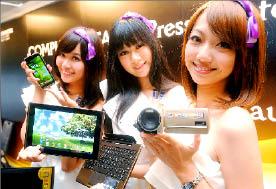You have only gotten halfway into the latest best-seller, but your electronic reader is running out of power?
Fret not, just flip open the protective cover and the built-in solar module will give your e-reader a quick energy boost.
That’s the latest invention from Atomtech Energy Group (亞通能源科技), which says its solar e-reader cover can provide a battery recharge that is sufficient for 800 pages of reading after exposure to sunlight for 60 minutes.

Photo: Lin Cheng-kung, Taipei Times
The company, which specializes in portable solar chargers, has customized its first e-reader cover for China’s largest e-publisher, Shanda Literature Group (盛大文學).
Shanda joined the crowded e-reader market in the third quarter of last year by launching its first “Bambook” e-book, which carries a price tag of about 1,000 yuan (US$154).
The second Bambook model will hit Chinese retail stores next month, and Shanda will promote Atomtech’s solar cover as a “must-have” accessory, Atomtech sales manager Amy Chueh (闕素霞) said.
The solar cover doesn’t come cheap, though. The cost of an ordinary cover is only about 5 percent that of an e-reader, but those from Atomtech will amount to 15 to 20 percent, she said.
Atomtech is also devising solar covers for Apple Inc’s iPad 2 and Amazon.com’s Kindle. These accessories are expected to be in stores in North America during the second half of the year, she said.
The solar e-book cover from Atomtech is one of the 34 winning entries that stood out from 446 products submitted by about 170 Taiwanese and international exhibitors for the Best Choice Awards at Computex Taipei.
Now in their 10th year, the awards are presented by the Taipei Computer Association (TCA, 台北市電腦公會), a co-organizer of the Computex.
National Taiwan University is entrusted with the task of forming a panel of judges composed of academics, researchers, local and foreign media and industry experts to pick the best products based on three criteria: functionality, innovation and market potential.
In addition to the 34 winning products, a “Best Choice of the Year” product will be announced during Computex’s opening ceremony on Tuesday next week.
“Participating exhibitors at Computex introduce more than 10,000 products during the exhibition every year,” TCA secretary-general Enoch Du (杜全昌) said in a statement.
“The award aims to help overseas buyers find the most outstanding ICT [information and communications technology] products fast in a one-stop platform,” Du said.
Other winning entries include the Eee Pad Transformer TF101, a tablet PC from Asustek Computer Inc (華碩); the 2U 18-Blade Green Server for cloud computing from VIA Technologies Inc (威盛電子); the Video Memo, a card-sized voice recorder, from Gajah Technology Co (佳也科技); as well as the ZigBee Home Automation System from Netvox Technology Co (鉅康科技).
The 31st Computex Taipei, the world’s second-largest ICT trade show after Germany’s CeBIT, is setting a new record this year in scale, with booth numbers expanding 8 percent from last year to 5,200.
For the first time, all five Taipei World Trade Center exhibition halls will be used to house 1,800-plus local and foreign firms.
The trade fair is expected to attract 36,000 foreign buyers to source tech products and components from Taiwan, with an increasing number coming from emerging markets such as China, Russia, Indonesia and India.

SEEKING CLARITY: Washington should not adopt measures that create uncertainties for ‘existing semiconductor investments,’ TSMC said referring to its US$165 billion in the US Taiwan Semiconductor Manufacturing Co (TSMC, 台積電) told the US that any future tariffs on Taiwanese semiconductors could reduce demand for chips and derail its pledge to increase its investment in Arizona. “New import restrictions could jeopardize current US leadership in the competitive technology industry and create uncertainties for many committed semiconductor capital projects in the US, including TSMC Arizona’s significant investment plan in Phoenix,” the chipmaker wrote in a letter to the US Department of Commerce. TSMC issued the warning in response to a solicitation for comments by the department on a possible tariff on semiconductor imports by US President Donald Trump’s

‘FAILED EXPORT CONTROLS’: Jensen Huang said that Washington should maximize the speed of AI diffusion, because not doing so would give competitors an advantage Nvidia Corp cofounder and chief executive officer Jensen Huang (黃仁勳) yesterday criticized the US government’s restrictions on exports of artificial intelligence (AI) chips to China, saying that the policy was a failure and would only spur China to accelerate AI development. The export controls gave China the spirit, motivation and government support to accelerate AI development, Huang told reporters at the Computex trade show in Taipei. The competition in China is already intense, given its strong software capabilities, extensive technology ecosystems and work efficiency, he said. “All in all, the export controls were a failure. The facts would suggest it,” he said. “The US

The government has launched a three-pronged strategy to attract local and international talent, aiming to position Taiwan as a new global hub following Nvidia Corp’s announcement that it has chosen Taipei as the site of its Taiwan headquarters. Nvidia cofounder and CEO Jensen Huang (黃仁勳) on Monday last week announced during his keynote speech at the Computex trade show in Taipei that the Nvidia Constellation, the company’s planned Taiwan headquarters, would be located in the Beitou-Shilin Technology Park (北投士林科技園區) in Taipei. Huang’s decision to establish a base in Taiwan is “primarily due to Taiwan’s talent pool and its strength in the semiconductor

French President Emmanuel Macron has expressed gratitude to Hon Hai Precision Industry Co (鴻海精密) for its plan to invest approximately 250 million euros (US$278 million) in a joint venture in France focused on the semiconductor and space industries. On his official X account on Tuesday, Macron thanked Hon Hai, also known globally as Foxconn Technology Group (富士康科技集團), for its investment projects announced at Choose France, a flagship economic summit held on Monday to attract foreign investment. In the post, Macron included a GIF displaying the national flag of the Republic of China (Taiwan), as he did for other foreign investors, including China-based